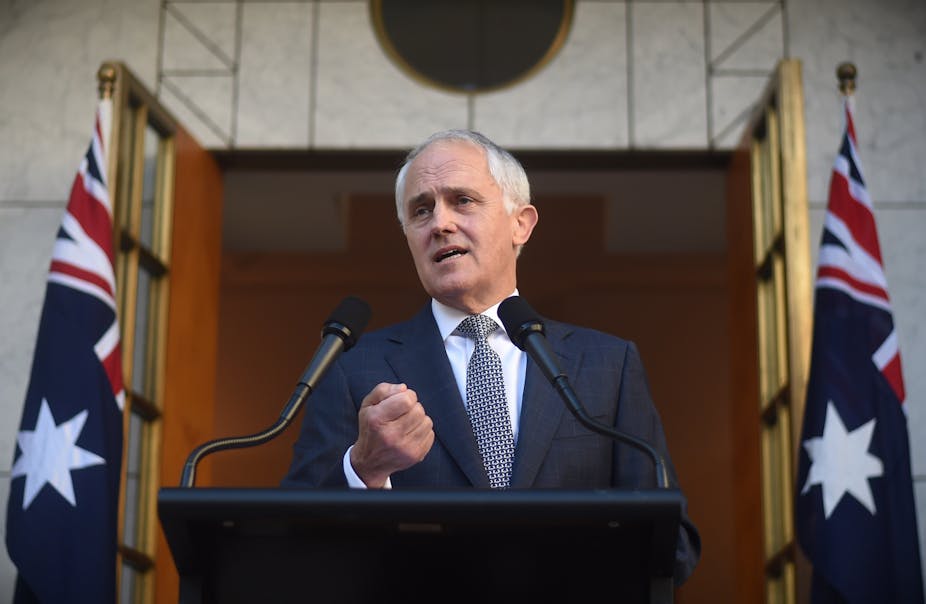Malcolm Turnbull has gone for broke in his dramatic overhaul of the Coalition team. The new prime minister is using this moment of high authority to “renew” to the max – unlike Tony Abbott’s ill-judged timidity in the past.
By his changes Turnbull has sent strong messages to women and to younger generations.
He’s moved beyond the John Howard era in some respects, and returned to it in others.
Those who helped him seize the prime ministership have been predictably rewarded. Some enemies are out but others firmly in the Abbott camp, such as Mathias Cormann – who rises to deputy Senate leader while keeping his key finance portfolio – have had their abilities acknowledged.
Economics and innovation will be at the heart of the Turnbull government’s priorities, as the Australian economy faces its difficult transition after the mining boom.
Turnbull will himself take on much of this debate, in which Abbott was found wanting. Scott Morrison as treasurer will be able to sell the government economic message better than Joe Hockey did. And a big message it seems likely to be, with Turnbull affirming that “certainly my government has a major focus on tax reform”.
The economic team is also being strengthened in other ways, with the new assistant treasurer, Kelly O'Dwyer, given a cabinet spot. Previously the post was in the outer ministry. Christian Porter will also be in cabinet – he takes the social services portfolio but as a former West Australian treasurer he is well qualified to help with the economic heavy lifting.
Christopher Pyne’s mettle will be tested in his new portfolio of industry, innovation and science. Over the years, under both Coalition and Labor governments, many promises have been given to make Australia an innovative society. Actually delivering on the hype is always more difficult.
What will happen to Pyne’s proposed deregulation of the universities, which the Senate has refused to pass, was not clarified by Turnbull on Sunday. He’s anxious to stress that cabinet has to consider policies.
Turnbull’s despatch of Kevin Andrews, who departed with loud complaints, and Eric Abetz, both old-guard conservative Abbott loyalists, was not unexpected.
Bruce Billson is rather a different matter. His profile had been high after the “small business” budget. Turnbull was willing to keep him, but in the outer ministry rather than the cabinet. Billson was foolish to reject the offer.
Hockey had been expected to be retained in the team while losing treasury. But instead he has opted to quit parliament and is bound for Washington as Australia’s ambassador. It will be a good transition for him, probably to a business career later. If Abbott had persuaded his treasurer to take that post a few months ago, he might have shored up his own position.
Female representation in cabinet has jumped from two to five, with Marise Payne being elevated from human services to defence.
Payne, a moderate, has been publicly one of the quietest ministerial voices in the government. But in human services, which delivers social and health-related payments and services, she has administered a huge and complex bureaucracy and apparently done it very competently. The challenges in defence are enormous but she made it clear it was a job she wanted.
The boost to women’s frontbench representation has been a matter of pushing them up to higher levels, rather than a significant expansion of numbers. There is only one extra – Anne Ruston, a Liberal from South Australia, who will be assistant minister (the new term for parliamentary secretary) with responsibility for water resources. This is an appointment aimed at offsetting SA concern at water moving from the Liberals to the Nationals under the Coalition deal Turnbull did last week.
It is understood that Nola Marino, one of the whips, will be promoted to chief government whip, a position now held by Scott Buchholz.
Turnbull’s creation of a minister for cities and the built environment, under Jamie Briggs, is a good move politically. He is injecting the government into a debate that has been more often Labor ground, most recently emphasised by Anthony Albanese in his Saturday Light on the Hill address in Bathurst.
Turnbull said: “We often overlook the fact that liveable cities, efficient productive cities, the environment of cities are economic assets”. An inveterate user of public transport up to now, Turnbull does not share the roads fetish that has marked the Coalition government; in his mind “there is no place for ideology” when it comes to infrastructure and various modes of transport.
Arthur Sinodinos’ appointment as cabinet secretary is part of Turnbull’s attempt to recreate the style of cabinet government he recalls from the Howard era, when he was a minister.
“The gold standard of good Coalition cabinet government was during the Howard government and … Arthur was at the centre of that as John Howard’s chief-of-staff for over a decade,” Turnbull said.
Sinodinos is confident that the Independent Commission Against Corruption when it reports will not cause problems that will affect his position.
Turnbull’s changes and strategic thinking can only strike more fear into the opposition. It is no good Bill Shorten just rushing out and reacting – he needs to look carefully at how his own team can be re-shaped to improve its ability to deal with a government that has potentially considerably more firepower.
In politics what goes around can sometimes come around very quickly. And so it was on Sunday afternoon, when Turnbull rang Tasmanian Liberal Andrew Nikolic to tell him he was no longer one of the government whips. The call came just over a week after Nikolic had texted Turnbull to try to force him into a public statement ruling out a challenge to Abbott.
Listen to the latest Politics with Michelle Grattan podcast with guest, Arthur Sinodinos.

